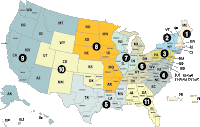In Wells Fargo Bank, N.A. v. Giglio (4D12-418), the Fourth District held that the trial court erred in refusing to grant a motion to vacate a foreclosure judgment. In this case, on the eve of the foreclosure sale, the borrower tendered funds to the lender sufficient to bring the loan current. Based upon that tender of funds, Wells Fargo sought to cancel the foreclosure sale and ultimately to vacate the sale that did occur. The trial court granted the motion to vacate the sale but refused to vacate the judgment.
The Fourth District stated that "Put simply, Giglio cured the default and the parties settled their dispute, an outcome the law favors." Therefore, the court ultimately held that:
We hold that the trial court, having vacated the foreclosure sale, abused its discretion in refusing to grant the related collateral relief requested by Wells Fargo, which refusal prevented the parties from concluding their settlement. See Toler, 78 So. 3d at 701 (“An order denying a motion for relief from judgment is reviewed for an abuse of discretion.”). The trial court clearly had jurisdiction to consider Wells Fargo’s Rule 1.540(b)(5) motion; and in light of the parties’ settlement --a result the law seeks to encourage -- the relief requested should have been granted. See Wells Fargo Bank, N.A. v. Lupica, 36 So. 3d 875 (Fla. 5th DCA 2010).In a footnote the court noted that they were not holding that a trial court was always required to vacate a judgment based upon the settlement of the parties and that there may be circumstances when other influences would support denying such a motion. However, there were no other influences in this case.



0 comments:
Post a Comment